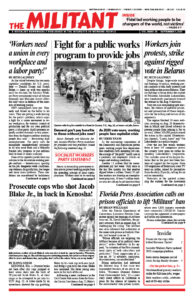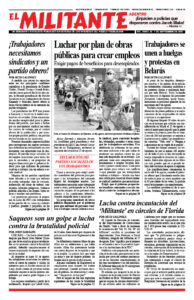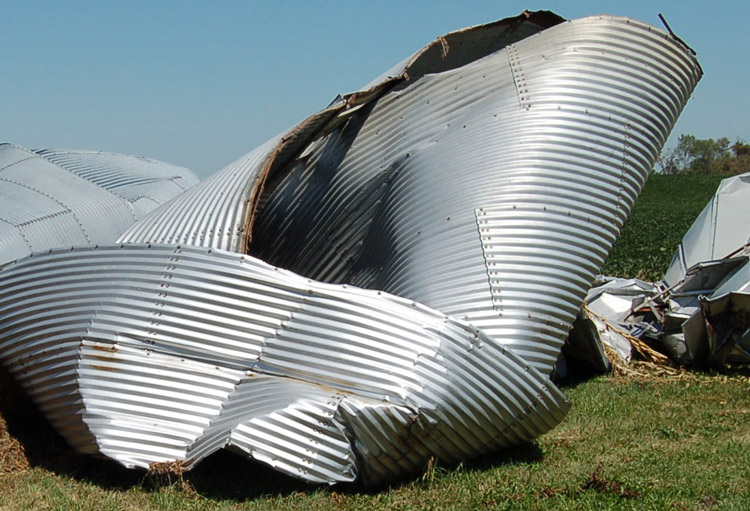CEDAR RAPIDS, Iowa — With little warning, a severe windstorm tore through the Midwest Aug. 10 destroying homes and farmland. But the devastation it left was turned into a social disaster by state and federal governments, whose one message to workers and farmers has been, “you’re on your own.”
From South Dakota to Ohio, winds of over 100 mph leveled corn and soybean cropland, toppled trees and power lines, and smashed grain silos and farm buildings. Three people died in Iowa and more than 60 were injured. One person died in Indiana. Hundreds of thousands were left without power for days.
Much of Cedar Rapids, Iowa’s second largest city with a population of more than 130,000, was devastated. Over 1,000 homes were destroyed and some 4,000 damaged. Nowhere did government officials mobilize resources to swiftly deal with the impact of the disaster.
“A week later we don’t even have food,” Genevieve Adams, a Nordstrom fulfillment center worker, told the Washington Post. Adams left her damaged home in Cedar Hills, near Cedar Rapids, with her 15-year-old son and has been surviving on a single meal a day.
In Marion, another town near Cedar Rapids, a food pantry staffed by volunteers, including from local churches, distributed foodstuffs and water to 10 times the normal number of people.
“The government is too slow,” Amanda Cooley told the Minnesota Star Tribune Aug. 23 as she headed to a friend’s home to help clear debris. “It’s the community that is responding.” Working people from near and far came to help clear the rubble, cutting up and removing fallen trees.
Some 14 million acres of corn and soybeans, more than a third of Iowa’s cropland, were heavily damaged. Tens of millions of bushels from last year’s harvest, kept in storage by farmers hoping for higher prices, were lost when metal silos were ripped apart.
Farmers face ruin
For working farmers throughout the region, the storm “has really been the straw that broke the camel’s back,” Larry Ginter, a retired hog farmer in Rhodes, told the Militant Aug. 23.
“There has also been a drought right now in Iowa, so we won’t see the damage to the soybean crop until harvest time.” The havoc wreaked by the storm came on top of government-imposed lockdowns that shuttered meatpacking plants, restricting demand for farmers’ animals.
Family farmers, forced continuously into debt to the banks, are facing more bankruptcies and losing their land today. Farm debt has grown to levels not seen since the 1980s.
Two days after the storm, the U.S. Department of Agriculture announced it would make assistance available for farmers. But according to the National Farmers Union, when funds were previously distributed under the Coronavirus Food Assistance Program the largest capitalist farmers pocketed more than 60% of the disbursements. The bottom 10%, struggling family farmers, received an average of only $300.
“One of our first demands needs to be: ‘No more farm foreclosures,’” Ginter said. “Anyone who wants to farm should be able to. No one deserves to have their farm or their home taken away from them.”
Samir Hazboun, Socialist Workers Party candidate for U.S. Congress in the 3rd District in Kentucky, drove through Iowa and witnessed the damage. He calls for immediate relief with the government covering farmers’ costs of production, including living expenses. “To immediately halt farm foreclosures,” he said, “my party demands nationalization of the land, putting the soil at the service of the farmers who till it.”
Hazboun contrasted the conduct of the government here to what he had seen during a solidarity trip to Cuba after a hurricane had hit there. The revolutionary government mobilized the population to evacuate from dangerous areas prior to the hurricane’s arrival.
It “organized brigades of construction workers and electricians to quickly restore power and repair structures,” Hazboun said. “They also had volunteers replant crops in damaged areas that could be ready for harvest. These kinds of initiatives build a stronger alliance between workers and farmers.
“This shows what the working class can accomplish when we are organized to use our labor to serve our class interests,” he added.


